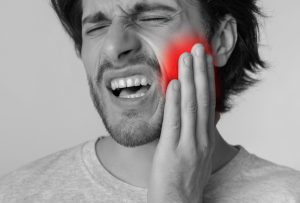

Do You Have a Toothache?
Picture this: It’s 2 AM and you’re tossing and turning in bed, unable to sleep. Your tooth is throbbing with a pain so intense that it feels like your jaw might explode. We’ve all been there — a relentless toothache can bring even the strongest person to their knees, longing for quick relief.
Toothaches occur for various factors such as tooth decay, an abscessed tooth, a tooth fracture, a damaged filling, repetitive motions like grinding teeth or chewing gum, infected gums, and more. If you experience severe pain lasting longer than 1 to 2 days accompanied by swelling around the tooth, fever or headache, foul-tasting drainage from the infected tooth, or other symptoms — see a dentist immediately to prevent the further spread of dental infections.
Causes of Toothaches
Toothaches can be an annoying and excruciating experience that can severely affect daily life. While some choose to ignore their toothache, it’s essential to know that they’re not just minor discomfort and can lead to severe dental problems if left untreated.
The most common cause is decay caused by cavities, which are tiny holes in the teeth due to bacteria buildup. Gum disease is another factor that causes tooth pain. This condition involves inflammation of the gums, leading to gum recession and tooth loss.
Trauma and irritation play a significant role in toothaches. Constant grinding or clenching of teeth exerts pressure on them, leading to oral complications such as chipping, cracking, or fracturing of the teeth. Other activities like chewing gum also put too much pressure on the teeth and jaw muscles, causing discomfort.
Dental Decay and Infections
Dental decay refers to the destructive process that occurs in a tooth structure, leading to cavities or holes caused by bacteria. When plaque forms on teeth from food debris and bacterial accumulation, it releases acids that wear away at enamel (the outer layer covering the teeth). As a result, holes will form, known as dental caries, resulting in sensitivity or pain.
If left untreated, these cavities can penetrate deep into the living tissues of the teeth (pulp), leading to infection/inflammation necessitating root canal treatment or extraction.
A bacterial infection called an abscess develops when pus collects inside an inflamed tissue’s pocket within a tooth or gum area. Abscesses usually cause severe throbbing pain that spreads to other body parts (ear or throat) and fever. If left untreated, they can cause tooth loss and other severe medical complications as the infection can spread to other parts of the body.
An untreated cavity or infection can exacerbate oral health problems over time. It’s essential to see a dentist for regular checkups every six months or more frequently if there are underlying health complications like diabetes that can maximize the occurrence of cavities.
Trauma and Irritation
Tooth trauma and irritation can cause toothaches that range from mild to severe. Trauma can occur due to an injury or accident where the tooth is knocked out, chipped, or fractured, while irritation can happen due to habits such as teeth grinding or clenching.
Toothache pain from trauma can be severe and unbearable. In some cases, it may indicate a more serious underlying condition, such as nerve damage or a jaw fracture. See your dentist if you experience this kind of toothache so they can assess the severity of the injury.
Teeth grinding and clenching are common causes of dental irritation that can lead to toothaches. These habits can wear down the tooth enamel and create tiny fractures in your teeth that allow bacteria to enter and cause infections. This irritation can also cause inflammation and pain in the gums around your teeth.
For example, imagine you grind your teeth at night and wake up with a toothache every morning. You may believe that the pain is caused by something you ate the night before or an allergy, but eventually, you realize it’s related to a teeth-grinding habit.
If you suspect that your toothache is due to trauma or irritation, there are several things you can do to get relief. An ice pack applied to the affected area can help reduce swelling and alleviate pain. Over-the-counter pain relievers such as ibuprofen or acetaminophen can also provide temporary relief. However, these remedies only mask the symptoms rather than address the underlying problem.
Gum Disease
In addition to tooth decay and injuries, gum disease is another common cause of toothaches. Gum disease can occur due to poor oral hygiene habits that allow plaque to form on teeth, leading to inflammation and infection. Gum disease can also spread from untreated cavities or infections in teeth.
Symptoms of gum disease include:
- Bleeding gums
- Receding gum lines
- Bad breath
- Loose teeth
Pain from a toothache caused by gum disease may be dull or throbbing and may be accompanied by swelling or pus around the affected area.
For example, you might have experienced soreness in your gums after consuming acidic food or if you accidentally bit them during your meal. Initially, the discomfort subsides with home remedies like rinsing with warm saline water. However, over time, these symptoms can’t be completely resolved due to underlying gum issues.
Treatment for gum disease depends on the severity of the condition. For mild cases of gingivitis (early stage of gum disease), better oral hygiene practices such as brushing twice a day and flossing regularly coupled with professional cleaning appointments may solve the issue. In severe cases of periodontitis, surgery may be required.
Home Remedies for Toothache Relief
Toothaches can strike at the most inconvenient time. You may be stuck in the middle of a meeting, out for dinner, or sleeping peacefully at night when it decides to make its presence known. While seeking professional help is always recommended, you may not be able to get to a dentist right away. Below are some home remedies that can help alleviate toothache pain fast.
While these home remedies may provide immediate relief, seek professional help once the initial pain subsides.
Saltwater Rinse
One of the most common remedies that people turn to is saltwater rinses. Mix half a teaspoon of salt in a glass of warm water and swish it around in your mouth for 30 seconds before spitting it out. This can help reduce inflammation and clean wounds if any exist. Additionally, pepper mixed with salt and water will also do the trick.
Clove Oil
Another popular remedy is clove oil, which has been used for centuries as a natural pain reliever due to its active ingredient, eugenol. Applying a small amount of clove oil onto the affected area with a cotton ball can provide immediate relief for minor toothaches. However, it’s important to note that this should only be used sparingly, and not on children or pregnant women.
 Hydrogen Peroxide
Hydrogen Peroxide
Hydrogen peroxide is another common household item that can be effective in easing toothache pain temporarily. Swishing a mixture of equal parts hydrogen peroxide and water in your mouth can kill bacteria and promote healing while providing temporary relief from toothache pain.
Natural Remedies
There are also natural remedies that can help reduce toothache pain. For instance, using an oil-pulling technique for 20 minutes every morning on an empty stomach has been found to help alleviate dental pain caused by many factors.
Another natural remedy that has gained popularity is aloe vera. Aloe vera has antibacterial and anti-inflammatory properties that can help relieve toothache pain and inflammation when applied topically.
Essential oils like tea tree oil and peppermint oil have antiseptic properties that can help kill bacteria causing toothache pain. Mixing a few drops in warm water and swishing around in your mouth for a couple of minutes can provide relief.
Over-the-Counter Pain Relievers
When toothache strikes, relief from the pain is a top priority. Over-the-counter (OTC) pain relievers can be an effective way to manage mild to moderate toothache pain while waiting for a dental appointment. However, they’re only masking the pain — so seeking treatment as soon as possible is essential to treating the root of the problem.
When to Seek Professional Help
While OTC medications and home remedies can be effective in managing mild toothache pain, severe or persistent pain should never be ignored. Seek prompt dental attention if any of the following are present:
- Toothache that lasts longer than 1 to 2 days
- Severe or debilitating toothache pain
- Fever or swelling around the affected area
- Foul-smelling or bad-tasting discharge from the affected tooth
- Difficulty opening the mouth fully
These symptoms may indicate a serious infection or abscess that requires immediate attention.
In addition to treating the underlying cause of toothache pain, dentists can provide recommendations on managing pain and preventing future episodes. They can also identify signs of gum disease or other dental problems that may contribute to toothache symptoms.
Remember: while OTC medications and home remedies can provide temporary relief from toothache pain, they should never be a substitute for professional dental care. If you’re experiencing toothache pain, seek prompt attention from a dentist to determine the underlying cause and receive appropriate treatment.
Preventing Toothaches
Preventing toothaches is always easier than treating them. Luckily, there are several measures you can take to stop them from happening. These measures are easy to incorporate into your daily life, and they’ll help ensure that you have a healthy mouth and teeth.

Also, make sure to watch what you eat and drink. Consuming sugary and acidic foods and drinks can create an environment that’s conducive to bacteria growth. These bacteria cause acid to accumulate on your teeth, which leads to enamel erosion, cavities, and toothaches. Eating a diet high in calcium and other nutrients, such as vitamin D, also helps keep your teeth strong and healthy.
Another way to prevent toothaches is by reducing repetitive motions such as grinding or clenching your teeth. Some people grind their teeth unconsciously while they sleep, which causes damage over time. Your dentist may prescribe a night guard or bite plate, which helps reduce tension within the jaw muscle or offer customized solutions based on the severity of your situation. Other habits, such as chewing on hard objects like ice cubes or pen caps, can cause fractures in the tooth, leading to pain.
Frequently Asked Questions
What are some preventative measures that can be taken to avoid toothaches altogether?
Prevention is key to avoiding toothaches. To lessen the chances of toothaches, try the following:
- Maintain good oral hygiene habits: Brushing your teeth twice a day for two minutes, flossing regularly, and using mouthwash can help prevent the buildup of plaque and bacteria.
- Watch what you eat: Limit sugary foods and drinks as sugar weakens enamel, making teeth more susceptible to decay. Additionally, hard candy and chewing ice can damage teeth and cause toothaches.
- Protect your teeth during sports: Wear a mouthguard when participating in sports or other activities that could lead to a hard blow to the face or mouth.
- Go for routine dental checkups: Regular dental visits can catch any dental problems early on before they develop into painful issues that require extensive treatment.
Can certain foods or drinks make toothaches worse?
Yes, certain foods and drinks can make toothaches worse. Foods and drinks high in sugar content, such as soda, candy, cakes, and other sweets, can cause dental decay and cavities if consumed frequently. This can lead to toothaches and sensitivity.
Additionally, hot or cold foods and beverages can also exacerbate tooth pain. Acidic beverages, like orange juice, lemonade, or vinegar-based sauces, may erode your tooth enamel over time, making them more prone to sensitivity and toothaches.
What are common dental procedures that may cause toothaches as a side effect?
Common dental procedures that may cause toothaches include:
- Dental Fillings
- Root Canal Therapy
- Dental Crown Placement
- Teeth Whitening
Don’t Endure a Toothache — See Your Dentist Today!
If you’re experiencing severe tooth pain, see your dentist as soon as possible. Don’t let a treatable toothache progress into further dental issues. Get your oral health back on track today!



 Hydrogen Peroxide
Hydrogen Peroxide